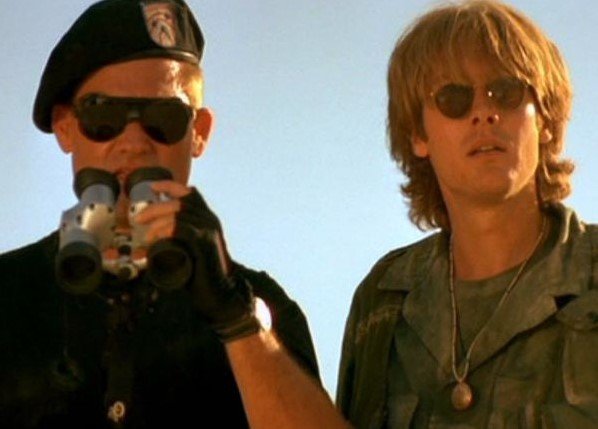Nearly three decades later, Roland Emmerich’s 1994 movie still stuns — but not always for the right reasons
Let’s get this out of the way up front: watching Stargate for the first time in 2025 is… an experience. Not always a good one, not always a bad one — but definitely one worth talking about. Especially if you’ve already binged Stargate SG-1 and Atlantis and are curious about where all that wormhole madness actually began.
Spoiler alert: it’s not what you’d expect.
Roland Emmerich’s original 1994 film is part science fiction, part ancient mythology, part military drama — and kind of unsure how much of each it wants to be. It’s loud. It’s serious. It’s weirdly self-important. But it’s also foundational. Without it, the sprawling Stargate universe we love today wouldn’t exist.
The story is wild — and just a little hollow
The plot kicks off with an ancient Egyptian artifact being unearthed in 1928. Fast forward to the ’90s, and linguist Daniel Jackson (James Spader) is pulled into a military program to decode the thing. It turns out to be a literal stargate — a portal to another planet. What follows is an interstellar trip to a desert world ruled by a pseudo-deity named Ra, played by Jaye Davidson with cheekbones sharp enough to cut through sandstorms.
The story unfolds like an Indiana Jones fever dream. But instead of wit and wonder, Stargate serves up melodrama and machine guns.
There are great ideas buried in here — ancient aliens shaping human civilization, galactic slavery, language as a key to power — but the execution often trips over itself. Dialogue? Wooden. Pacing? Uneven. Character development? Let’s just say it’s thin enough to see through.

James Spader looks confused — and it totally works
Spader plays Jackson like a man constantly questioning every life choice that brought him to this moment. It’s oddly perfect.
He’s twitchy, earnest, overwhelmed — the only character who seems to understand just how absurd this whole situation is. Watching him try to navigate desert warfare while talking about hieroglyphs is weirdly charming.
Kurt Russell, meanwhile, plays Col. Jack O’Neil with the emotional range of a granite countertop. He’s grieving a personal tragedy, we’re told, but that mostly translates into clenched jaws and empty stares. Still, there’s something about the contrast between Spader’s nervous energy and Russell’s emotional constipation that almost balances the film.
One sentence break.
The tone swings harder than a sandstorm
This is where things get really messy. Stargate doesn’t know if it wants to be an introspective science film or a guns-blazing action epic. It leans heavy into slow world-building for the first hour, then suddenly explodes into a third act full of rebellion, lasers, and child soldiers with makeshift spears.
At one point, the movie wants you to feel awe at the scale of an alien pyramid ship descending from the sky. The next moment? It’s trying to convince you that a single linguist can rally an oppressed civilization by yelling in half-translated Egyptian.
And somehow, this tonal confusion is kind of fascinating.
Why it worked — even if it shouldn’t have
Here’s the wild part: audiences loved it. Critics? Not so much. But moviegoers in 1994 poured into theaters. The film raked in $196 million worldwide, spawning comics, novels, and ultimately one of the most beloved sci-fi TV franchises of all time.
That success didn’t come from perfect storytelling. It came from the idea of Stargate.
The concept of an interstellar travel device buried in ancient ruins — blending mythology, science, and military intrigue — was just too good to ignore. It didn’t matter that the movie didn’t fully know what to do with it. The seed was planted.
And to give Emmerich credit: he went all in. The visual scale was massive for the time. The set design, costuming, and Ra’s alien tech all felt fresh, even if the storytelling didn’t.
Watching it after the TV shows changes everything
If you’ve already watched Stargate SG-1 or Atlantis, going back to the 1994 movie is like reading a rough draft of a story you already know and love.
Here’s what shifts when you watch in reverse:
-
Jack O’Neil in the movie is brooding and borderline suicidal; on TV, he’s a snarky dad-joke machine.
-
Daniel Jackson goes from soft-spoken nerd to a fully confident intergalactic diplomat.
-
The mythology expands dramatically in the shows — you get new alien races, complex politics, and way more emotional depth.
The film barely scratches the surface. But watching it with that context in mind adds a strange kind of nostalgia — even if it’s not your nostalgia.
It’s flawed. It’s loud. It’s still kind of iconic.
At the end of the day, Stargate is a movie that feels both ahead of its time and oddly stuck in the past. It’s earnest sci-fi mixed with explosive ‘90s spectacle — not quite Star Wars, not quite Dune, but somewhere awkwardly in between.
The dialogue may be clunky, and the pacing may be all over the place, but the bones are strong. There’s a reason people still talk about it. There’s a reason it launched a franchise. And there’s a reason it still gets watched — and argued about — 30 years later.








